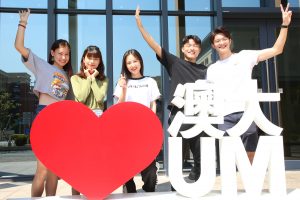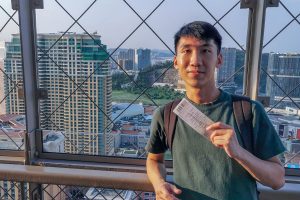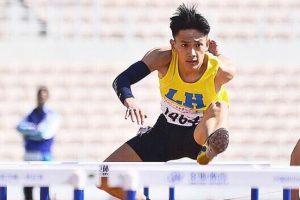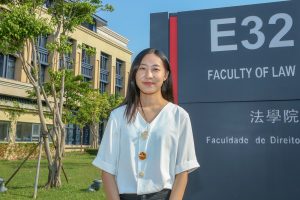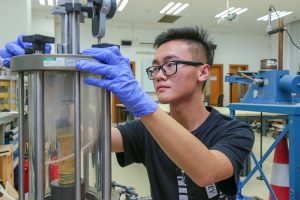In 1999, Macao was handed over to China and the Macao Special Administrative Region (SAR) was established. Those who were born in Macao in 1999 have, in a sense, grown together with the city. Today, these young people have reached the age to attend college, and some of them have chosen to study at UM. Soon, they will graduate and become pillars of society. In this article, we interview some of these students to learn their thoughts about their personal growth and the development of Macao over the past two decades, as well as their expectations for their university education.
Rapid Development of Macao
Lou Chi Keong, a third-year student of the Bachelor of Business Administration program (Global Business Management), is the third child in his family. His mother endured difficult labour experiences when giving birth to her first two children, with the second birth even requiring a massive blood transfusion. But Lou’s birth was very smooth. Summing up the greatest changes in Macao and his own family over the past two decades, Lou says, ‘Macao has developed rapidly. Life used to be hard, but now our quality of life has improved substantially.’
He adds, ‘A university is a microcosm of society, where you have to rely on yourself for everything. In the process you learn to advocate for yourself and protect your rights and interests. I believe these skills will be very useful when I enter the workforce. UM has a lot of resources, and the friends we make here will be a valuable asset for our future careerdevelopment. There are so many universities in Macao, but UM is the only one to be allocated a piece of land for the construction of a new campus. This shows UM is highly regarded by the central and Macao SAR governments. Over the past two decades, UM has developed rapidly, riding the wave of fast economic growth of China, which is indeed a blessing for everyone at UM.’
An Exciting Transformation
Lei Kin Chong is a second-year student in the Department of Government and Public Adminis- tration. When he announced his initial arrival in the world with a noisy cry, Macao was just a quiet, sleepy town. But over the past two decades, he has witnessed exciting changes in almost every arena of society, including economy, governance, and quality of life. ‘These changes afford us young people the luxury of chasing our dreams and doing what we love to do,’ he says.
Lei hopes to discover his interests as well as to acquire professional knowledge and skills at UM. He says money will not be his sole consideration in the choice of jobs; he hopes to find a job that he genuinely enjoys.
Bilingual Proficiency a Competitive Advantage
In the 2014/2015 academic year, UM launched a five-year bilingual bachelor of law programme, conducted in both Chinese and Portuguese, as part of an intensified effort to train high-calibre, bilingual professionals to support Macao’s development into a service platform for trade cooperation between China and Portuguese-speaking countries. Leong Weng Ian is a third-year student enrolled in the programme. She thinks the programme can help her gain a better understanding of Macao’s legal system. ‘Also, bilingual proficiency will give me a competitive advantage on the job market,’ she says.
Leong feels very proud of Macao’s rich cultural heritage. She says, ‘When you walk on the streets, you could see the influence of Portuguese culture everywhere, but you could also see the influence of traditional Chinese culture. Because of this unique cultural diversity, Macao was able to play the important role of a ‘bridge’ that connects China and Portuguese-speaking countries after Macao’s handover.’
A Milestone in Higher Education History
Wong Si Teng is a third-year student in the Faculty of Education, majoring in primary education. She says the greatest change Macao has experienced over the past two decades is its transformation into a vibrant cosmopolitan city. One event that stands out in her memory was Typhoon Hato in 2017. ‘After the typhoon, organisations and individuals in Macao voluntarily helped to clean up the streets and distributed food to senior citizens and people with disabilities living on higher floors. I was one of the volunteers, and the sense of unity we felt at the time was deeply moving,’ she recalls.
When asked why she chose UM, she says, ‘Because I grew up in Macao. I like it for its uniqueness. The big campus and a genuine college experience with on-campus accommodation were also a big draw for me.’
With the support of the central and Macao SAR governments, UM relocated to the current campus on Hengqin Island, Guangdong province, in 2014, a move which Wong says was an important milestone in Macao’s higher education history. She explains, ‘The campus is larger, with better facilities for teaching and learning. Currently, we have 7 faculties, 10 residential colleges, and 3 state key laboratories, which greatly improve the quality of teaching and attract more and more talented people, faculty and students alike, from around the world.’
Increased Resources to Support Students’ Development
Lei Ka Chon is a third-year student in the Department of Civil and Environmental Engineering. He feels that since Macao’s handover, the SAR government has consistently increased its investment in education, one example of which is its support for the residential college system implemented at UM after the university’s relocation to the current campus. Lei praises the RC system, saying: ‘Students should not focus exclusively on studying textbook knowledge; they should also try to make more friends. This is where the RC system comes in. It provides an ideal environment for community and peer education, and allows students to meet people from different countries and backgrounds.’
Lei is an excellent chess player. He has represented Macao at various chess competitions, including the Asian Indoor Games. He is also an active member of student organisations. He believes that UM’s abundant resources and its emphasis on global experience and global perspective will give the students a major competitive advantage whether they choose to find a job or pursue further education in the future.
Source: UMagazine Issue 21
Related articles:Rose Lai: My Sense of Mission Urges Me to Return to UMAugusto Teixeira Garcia: Nurturing Legal Professionals for MacaoAgnes Lam: My Life Is Filled with Opportunities Given by UMWong Fai: PCT Facilitates the Transition of MacaoElvis Mak: 20 Years of Studying Microchips at UM

